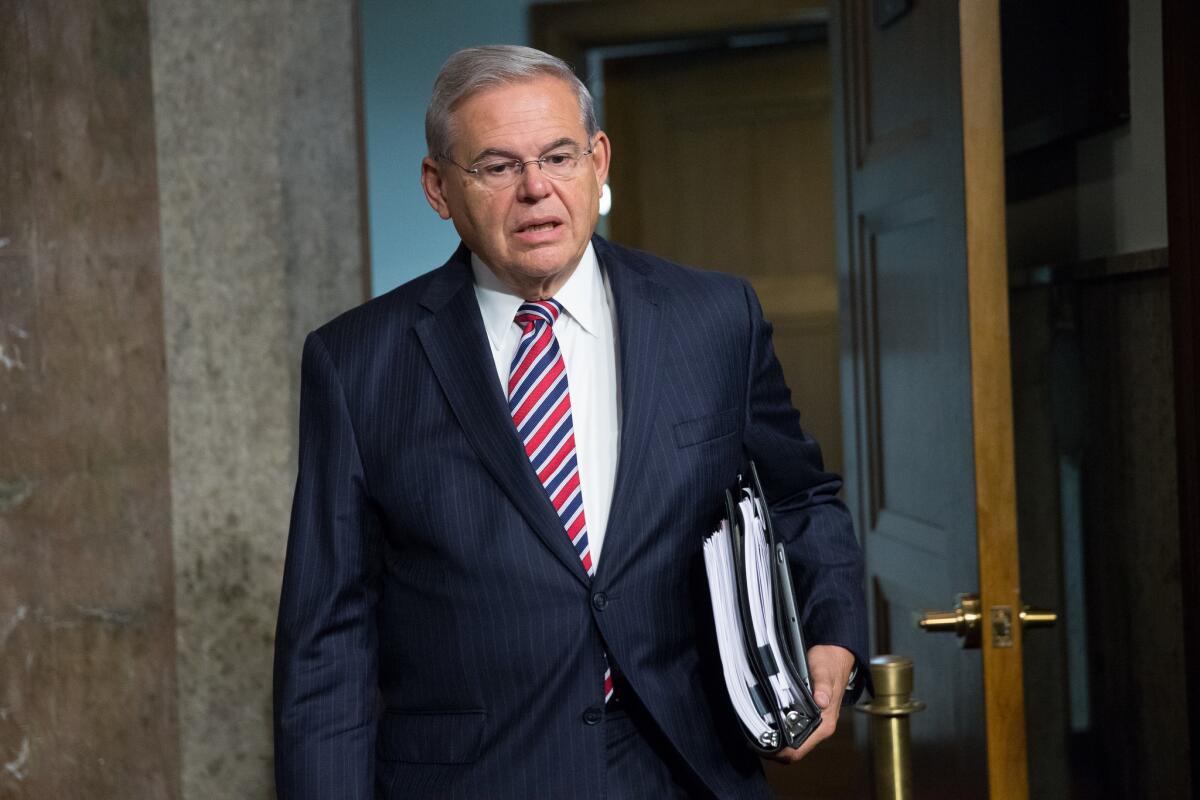In key test for prosecutors, a judge keeps alive the bribery case against Sen. Menendez

The bribery charges against Sen. Robert Menendez have survived a legal challenge for now, a relief for government prosecutors negotiating a tricky new landscape for corruption cases that the Supreme Court created with a decision a year ago.
Menendez (D-N.J.), once the powerful chair of the Senate Foreign Relations Committee, was charged in 2015 with taking part in a years-long corrupt scheme with Salomon Melgen, a wealthy South Florida doctor who Menendez says was a personal friend. Prosecutors say Menendez became his friend’s personal senator, accepting free plane rides and vacation stays while using his power to push for Melgen’s interests.
The Menendez case, the first trial of a sitting senator in a decade, is being closely watched by prosecutors and public officials across the country. It’s seen as an important test of prosecutors’ ability to pursue bribery charges after the Supreme Court rewrote the rules in a case involving former Virginia Gov. Robert McDonnell.
In that decision, the court threw out McDonnell’s conviction after finding that the judge in his trial had given jurors too broad a definition of what it meant to take an “official act” under the law. The ruling has resulted in judges throwing out a string of other corruption convictions.
The Menendez case seemed to be facing the same fate. Last week, U.S. District Judge William H. Walls said he had doubts that a key theory underpinning the prosecution’s case, known as “stream of benefits,” could still be used.
In a stream of benefits case, prosecutors allege that a public official was bought with a series of gifts over time, not necessarily a particular payoff tied to a single action. That’s the way it happened between Menendez and Melgen, in the prosecutors’ telling. Defense lawyers have argued that there was no real connection between the gifts and any “official actions” taken by Menendez.
“In a realistic world, I think stream of benefits is very much alive in corruption,” Walls said last week. “But as to what the law is concerned … I am not sure” that the Supreme Court decision still allows that argument, he said. The Menendez and Melgen case was the first to deal with the question after the McDonnell decision, he added.
Walls’ statements buoyed the hopes of Mendendez and Melgen, who saw a chance that the most serious charges would get wiped out before they even had to present a defense.
In his ruling Monday, however, Walls said he concluded that the decision didn’t touch the “stream of benefits” theory after all.
“The jury will decide whose version of what happened and what did not happen is more likely than not,” Walls said, adding that the evidence could support a conclusion that Menendez and Melgen had engaged in a corrupt relationship.
A decision to throw out the benefits theory would have been “like a blow to the chin, not just in this case but across the country,” for anti-corruption efforts, said Michael Weinstein, a former federal prosecutor now in private practice in New Jersey.
But he said the legacy of McDonnell might still come back to bedevil the government in the Menendez case, when it comes time for the judge to craft jury instructions. “He can really limit what the jury can consider and really tie their hands,” he said. “That’s going to be the next battleground.”
The McDonnell decision already has provided a get-out-of-jail card for several politicians convicted of corruption, at least temporarily. They include Sheldon Silver, once leader of the New York state Assembly, and William Jefferson, the former Louisiana congressman who was sentenced to 13 years after he was caught hiding $90,000 cash in a freezer.
A judge released Jefferson from prison on Oct. 5 after vacating the most serious convictions, even as he said that Jefferson’s actions were “plainly venal and reflected corrupt intent.”
The Menendez case will turn on how the jurors view the relationship between Menendez and Melgen, an ophthalmologist who favored expensive drug treatments and who once was the highest-billing physician in the Medicare and Medicaid system. In April, he was convicted of 67 counts of Medicare fraud in a separate trial in West Palm Beach, Fla.
Prosecutors, with no tapes or testimony that reveal the two men scheming, are juxtaposing the long history of gifts from Melgen and favors from the senator. Prosecutors say Menendez allowed Melgen to give him access to a luxury lifestyle he could not afford, giving him rides on a private jet to Melgen’s villa in the Dominican Republic and treating him to a stay in a luxury Paris hotel.
In exchange, the charges say, Menendez used his office to get visas for Melgen’s girlfriends, tried to pressure officials into honoring a port security contract for Melgen in the Dominican Republic, and leaned on Medicare officials to accept Melgen’s position in a dispute over billing for drugs. Menendez also is charged with failing to report the gifts on his financial disclosure forms.
Defense lawyers say the government is giving a twisted interpretation to the two men’s longtime friendship. The defense opened with testimony from the senator’s son, Robert Menendez Jr., who said that his buttoned-down father could find rare moments of relaxation with Melgen.
“They’re the best when they’re together. They’re like brothers to each each other,” Menendez Jr. said. “He can be jovial, he can laugh, he can unfortunately sing.”
“Being friends and being in a corrupt relationship aren’t mutually exclusive,” answered prosecutor Monique Abrishami. The trial is expected to last until Thanksgiving.
Twitter: @jtanfani
More to Read
Get the L.A. Times Politics newsletter
Deeply reported insights into legislation, politics and policy from Sacramento, Washington and beyond. In your inbox three times per week.
You may occasionally receive promotional content from the Los Angeles Times.







